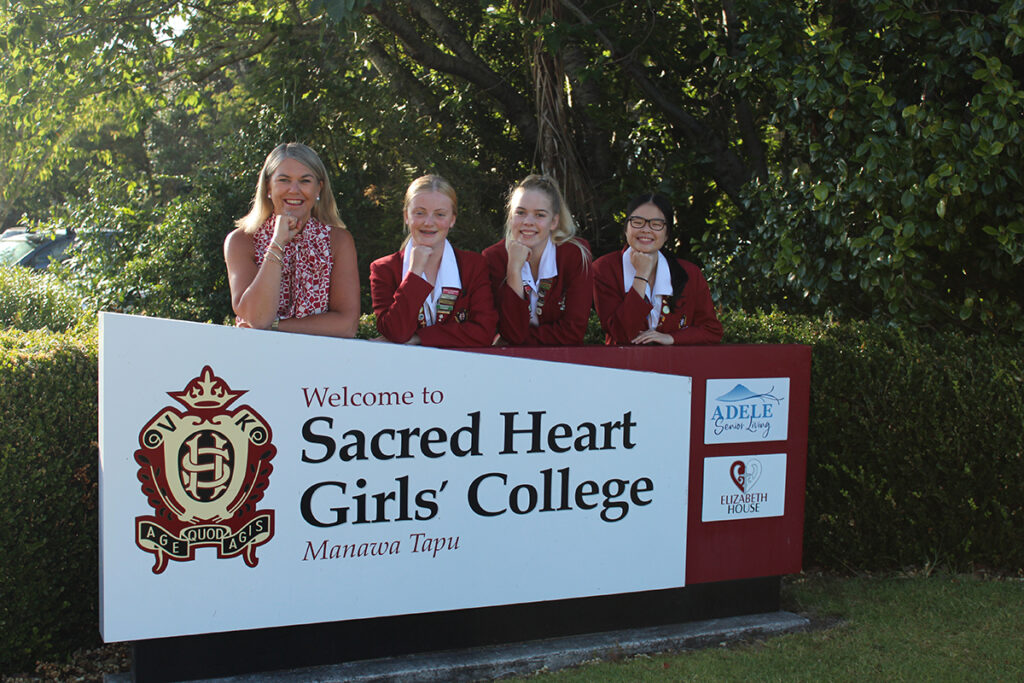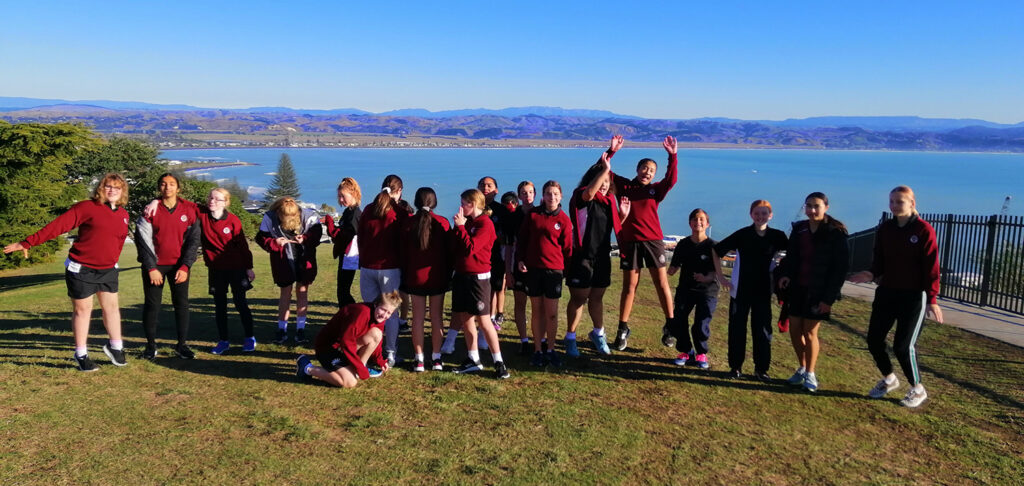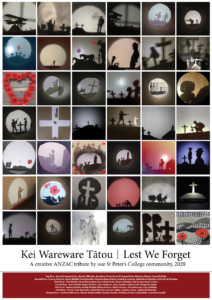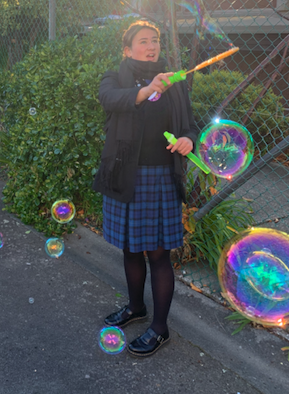Ko te Mātauranga Katorika i te Wā o Here Mate Urutā-19
Catholic Education leaders and their teachers and support staff have ensured school and tertiary programmes and pastoral outreach continued with the least amount of interruption for students possible during the Covid-19 lockdown restrictions. College principals from Wellington and Palmerston North dioceses as well as the Chief Executives of the New Zealand Catholic Education Office and Te Kupenga – Catholic Leadership Institute share their experiences.
New Zealand Catholic Education Office
Paul Ferris, Chief Executive

Lockdown level 4 has tested our resilience and demonstrated that we should expect the unexpected in our life journey. It has also shown us how strong we can be. I am proud of the way we prioritised our most vulnerable people and sought to manage the impact of this terrible virus. I am also mindful of the great fiscal impact this has had on many families and communities as they face an uncertain future with regard to employment. We must work hard to retain those children whose parents have been financially impacted by Covid-19. I trust our faith traditions will be reflected in our charity to others as we go through this year.
We are equally proud and heartened by the stories shared by so many in the way they managed this challenge, embraced isolation, distance learning and faith-based culture. I recommend you look at our website (www.nzceo.org.nz) for insights on what has taken place. The leadership of our principals and the commitment of our staff is worth celebrating. We have been impressed by the way students have stepped up and managed the loss of school camps, sport, school formals and productions and found other ways to support each other. It is important to remember these good things as we work our way back to some kind of normal.
The next few months will challenge us all. What will keep us together is the great hope we get from the religious traditions that underpin our Special Character. Finding strength from that mission and ensuring no one is lost to our schools will be hard, but it is important for us to model what we believe.
No one knows the extent of this financial hardship as yet. Only time will reveal what we must actually deal with but planning now to support families in our schools will be important preparation for what is to come. Communities will have received a letter from the New Zealand Catholic Bishop’s Conference and NZCEO. We hope this will provide some assurance as we navigate the future.
The Bishop’s wrote, on 1 May 2020, to the families of pupils attending Catholic schools urging them to contact the education/school office at their local diocese if they have problems paying attendance dues because of issues related to the Covid-19 lockdown.
The Bishop’s letter is on the NZCBC website at: www.catholic.org.nz/news/media-releases/catholic-school-families-urged-to-contact-diocese-if-having-problems-paying-dues/
Te Kupenga – Catholic Leadership Institute
Dr Areti Metuamate, Chief Executive
Te Kupenga, like all other tertiary institutions, was locked down for much of April and May. There was no face-to-face class and staff worked from home. While our way of working changed, we were able to keep the organisation operating and move all of our teaching to the online space – with some lecturers using Zoom for the first time ever to teach a class.
One focus of Te Kupenga is on reaching out to more people across the country to let them know of the amazing courses available to them in areas such as theology, leadership, philosophy, religious education, spirituality, scripture, ethics, and history. Our students – we have 447 studying this semester – are from all walks of life. Some are full-time – mainly the seminarians in Auckland – while most are part-time.
My feeling is that the recent Covid-19 experience has made us more willing and more able to teach in the online space and so I am keen to look more closely at how we can do this well. (www.tci.ac.nz)
FDMC – making remote connections
Martin Chamberlain, Principal

Under the tyranny of Covid-19, life as we knew it was slapped into abeyance. Francis Douglas Memorial College, New Plymouth, actioned alternatives involving internet, parents back in the classroom, online chat sessions, finding study niches in the home, mustering the willpower to resist balmy weather and coping with inevitable emotional outbursts.
Ministry advice was to bring holidays forward to give teachers time to prepare. Instead, we knew that students were in learning mode and made the big ask to our staff to action online learning immediately. They were given a nine-day break starting at Easter although it is reported many students worked throughout.
More than anything else, schools are mixing pots. Academia is the main task but we also have the role of socialising youngsters to see where they sit on the spectrum of human attributes. Without this daily personal reflection society would be a fractured and frightening place. Schools were denied that function during lockdown but how did the academic side go?
Every family will have its own story. For those under duress of unemployment or bereavement, learning was relegated to being dispensable. For the adolescent who had to have more willpower than usual, it was a struggle. For families with students at several schools, the battle for time online would have been interesting; while families with poor bandwidth would have been exasperated.
Within one day, 61 individuals, with more time on their hands, produced 29 pages of collated responses to our survey. Most frequent, were comments reflecting genuine gratitude for caring teachers mentioned by name. A lot said they had had few problems. Some commented on the positives of having their son’s company and assisting him to learn.
It was not all rosy however. Many others spoke of the challenges of working themselves while having several children whose online education made demands on them. Most students were missing school and their mates and many were being choked with more than they could cope with. Multiple emails and online meetings also eroded work time. Others found it challenging to break down material into intelligible chunks.
Remote learning – born of necessity but generally worked impressively.
Sacred Heart Girls’ College, New Plymouth
Paula Wells, Principal

The rapid experience of Sacred Heart Girls’ College, New Plymouth moving into lockdown will have been mirrored around the country. The rapid acceleration through the alert-levels saw New Zealanders in isolation sooner than anyone might have expected. From the outset, the Manawa Tapu approach was one of wellbeing first for its community. We were, and are, in unprecedented times. A Microsoft school had established TEAMS as its platform for learning and teaching materials over time, along with BYOD, meant that Manawa Tapu were agile and able to adapt quickly.
The school’s website homepage was re-configured with two tabs: Hauora@Home and Ako@Home. The Hauora@Home tab took visitors to the site to a range of wellness and wairua resources aimed particularly at managing trauma, change and uncertainty; with a link for student-specific resources and a link for caregiver-specific resources. The Ako@Home tab took parents and learners to key documents that captured expectations of learning remotely, and tips and suggestions for optimising the digital learning experience.
Secondary-aged students followed timetables in their remote learning, whilst the Year 7 and Year 8 students had live on-line lessons daily at 10am, with a range of tasks and activities to pick and choose from. Wellness of learners remained paramount with teachers re-designing programmes to move away from assessment; students were encouraged and supported to do what they were able, when they were able. Programmes and pedagogy were under constant review, with on-line experiences for learners continually enhanced and improved. The school remaining at home at both Alert Level 4 and Alert Level 3 allowed for consolidation, and rich, reflective practice amongst staff led to refined ways of engaging with learners, with a distinct shift to smaller-group live tutorials alongside week-long learning plans.
The school’s lead pastoral carers, Manaaki teachers, made personalised contact with each student once a week and a revised referral system was developed, helped by the Microsoft TEAMS analytics, to support those with heightened pastoral care needs. Staff connected through TEAMS with regular hui in faculties, and the college routine of Whakakaha three mornings a week continued: Monday’s gospel reading and reflection; Wednesday’s continued building of cultural capacity and responsiveness; and Friday’s Special Character and Charism nourishment.
Being a connected community remained crucially important, and our Facebook page was alive with activity with clips from the students’ leaders and a weekly ‘principal’s update’. Regular Covid-19 updates were emailed to caregivers and students, with the school APP alerting users to must-know information.
At Alert level 2, transitions to school for students and staff were managed with wellbeing first. Adapting to a new school, new routines and protocols, and lifting the tapu on what was a speedy departure under duress, took time. Prioritising being culturally and spiritually safe, and restoring connections and confidence enabled smooth transition.
Sacred Heart Girls’ College New Plymouth give thanks for the ethos of the Mission Sisters, and continue to Live their Mission through Ako, Manaakitanga and Wahine Toa.
St Patrick’s College Silverstream
Jane Hambidge, Tumuaki Tuarua, Deputy Rector, Teaching and Learning
Over the 50 days of lockdown our students, whānau and staff certainly embraced our motto of Sectare Fidem (Hold Fast to Your Faith). We navigated Google Meets, beards, bad hair, cats and kittens. Younger siblings and our parents. Many of our students talked about missing their friends and sports but several also embraced the time they spent reconnecting with their family. Many were also more intentional in how they connected via video calls to support their friends. Lots of time was spent helping younger siblings do homework and students had a new respect for how hard both their parents and teachers work. Over lockdown our priest Fr John Walls prepared and delivered a homily via Instagram once every two weeks to remind our community to hold fast to their faith. This kept us connected to the essence of who we are as a school particularly as we celebrated Easter in lockdown. The main challenge our staff faced was how to ensure deep and meaningful learning took place in the digital space whilst still managing their own bubbles. As we have returned to school we have welcomed our young men back and have met them ‘where they are’. Our school value theme for the Year of Unity Kotahitanga/Unity/Tu Fa’atasi: ‘We support everyone in our community to belong and we come together in the good times and the tough times’.
Sacred Heart College, Napier
Maria Neville-Foster, Principal

On Monday 18 May the girls of Sacred Heart College in Napier made their way up the hill to the beautiful site that they remembered as their place of learning. After almost eight weeks in lockdown and home-based online lessons, the students and staff are now transitioning to the new norm. Keeping distancing on our minds we are being more creative with our greetings – no more hugs – canteen lines, and classroom arrangements. We are reminded of the need to abide by the health guidelines through posters, new class protocols and social-media platforms.
At our first whole-school assembly we celebrated with pride what we as New Zealanders have achieved as a nation. To help ensure we stay on track to beat Covid-19 we still have a number of restrictions in place. Several school events were removed from our calendar, including our School Ball. Our sports codes will resume practices in early June with the hope the competition season will begin in Term 3.
The wellbeing of our whole Sacred Heart Community has been our number one focus. Our next step is not looking back at what has been missed but looking towards what we can optimise for the future with our ‘hearts and minds in harmony’.
St Bernard’s College, Lower Hutt
Simon Stack, Principal

Like most schools we had started planning for remote learning the week before it actually happened. Despite this, lockdown came suddenly. Tutor teachers spent that first few days making contact with every family by phone to check on our boys’ wellbeing and to identify any issues around access to devices. The next couple of weeks were spent trying to get our limited stock of Chromebooks out to families who had no devices.
We ran our normal timetable with Google meets and Google classrooms for all of the classes. Assessments were done and learning happened. But the boys’ stories are just being told to us now. For some it was great – for others not. We co-ordinated our monitoring of who was engaging and again the phone calls home to check on wellbeing and where we could help. Level 3 saw a bubble of four boys in school with remote learning but also some technology classes for them. Level 2 saw Years 7–10 students back on Monday 18 May and the whole school on Tuesday 19 May. We started with a liturgy together – prayers of thankfulness that we are safe and together again when around the world so many are not. And the message of Easter – hope!
St Peter’s College, Palmerston North
Margaret Leamy, Deputy Principal, Curriculum


We are all so incredibly proud of our young people here at St Peter’s College who embraced and transitioned so smoothly into distance learning at home over almost eight weeks of lockdown.
Our vision says: ‘St Peter’s College celebrates being a Catholic Faith Community where students, teachers and families work in partnership to develop empowered, self-managing, life-long learners, who live the Gospel values in a changing world.’ This vision has been lived out in these challenging times with enthusiasm and support for one another. Our teachers have worked extremely hard to make the learning enjoyable and achievable, whilst taking on the needs of all our students. It has been a wonderful opportunity to see what is possible – and that has been plentiful!
We were able to maintain our competitive House spirit by having House challenges – from handstands to trick shots! Leading up to Anzac Day we collaborated in a school-wide project to produce a photographic series, which became a video commemoration. Past and present students and members contributed from their isolation bubbles. The Anzac Day video, accompanied by the sound of The Last Post, was shared and viewed by many on our St Peter’s College Facebook page.
Our senior leaders continued to support their peers by creating videos to motivate and support everyone. And we had classes sending messages about what was important in these unprecedented times.
As we embark on our journey back to school, we bless all our families, staff and wider community that they may continue to keep safe in this changing world.
Garin College, Richmond
John Maguire, Principal

With the onset of Covid-19 Alert Level 3 closely followed by Level 4 Lockdown 25 March, Garin College, like all schools, was thrown into planning and preparation for online learning to be launched post the Term 1 holidays, 15 April. As I write this, I am on the eve of opening Garin College to all students at alert Level 2 and there is much anticipation and excitement felt my students, staff and parents.
Our journey into online learning has been amazing. From the outset, we set about developing our philosophy for our online learning programme: 1/3 collaboration and connectedness; 1/3 continued learning; 1/3 other learning experiences. At the heart of our shift to online learning was relationships and Hauora. Our aim was for Garin students to maximise learning opportunities and outcomes through learner agency, high-quality teaching and faith-based learning.
We recognised the context for learning would vary greatly between students and families. We set out to recognise the value of the learning that would naturally occur in the home and celebrate this. We asked our teachers to peer back their learning, to ensure there was a balance in what we were expecting from our learners and that the 1/3,1/3,1/3 approach was successful.
The outcome for Garin learners has been exciting. We have seen a true sense of learner agency emerging from our students and high levels of engagement in the learning moments provided by our wonderful teachers and support staff throughout the weeks of learning online. The key to the successful engagement has been students’ digital connectedness to their teachers and support staff. Relationships and conversations emerged that provided structure and guidance for both the most independent learners and those more challenged by this new world of learning. Our parents and caregivers proved pivotal as they stood alongside learners daily to nurture and encourage them. Ensuring the wairua of Garin was alive we maintained our online Principal Assembly and Student Assemblies each week via video recordings and students shared life in their bubbles through contributions to these weekly video assemblies.
As we settle back into the new reality of Alert Level 2 and develop necessary routines, our focus is on our students and staff wellbeing, we are taking time to share and listen to their stories, and to learn from our collective experience. We want to take the best of this exciting journey and grow our curriculum to recognise the Learner Agency our students have so profoundly demonstrated throughout this time, to explore the many curriculum innovations that have emerged through our staff’s practice of online teaching, and consider the potential of these innovations to influence Garin curriculum design into the future.
St Catherine’s College, Kilbirnie
Steve Bryan, Principal

On Monday 23 March at 1.30pm we heard our Prime Minister announce that in 48 hours the country was going into ‘lockdown’; transitioning into Alert Level 4. Schools closed and a whole new paradigm of teaching and learning was ushered into the lives of teachers, students and their families.
Email, Zoom, Google chat, Google classroom became the norm for teacher-student engagement. Under the leadership of DRS, Ilana de Vos, Youth Minister Teresa Rayner, and Yr 13 students, innovative strategies for connecting students and staff with the Mercy Special Character of St Catherine’s were nurtured and sustained. Over Easter, and the unusual times of lockdown, liturgies, wellbeing programmes, videos, quizzes, sacramental programme, were shared with fervour, spirit and faith by the St Cath’s community.
It wasn’t all plain sailing. Surveys generated by St Cath’s staff of teachers’ and students’ challenges with online learning revealed areas for correction. Student access to devices, managing the amount of online learning, and support for the learning needs of students, were challenging aspects of being disconnected from school and the immediacy of personnel and resources.
Announcements that the country was heading back to Alert Level 2 and a return to school were greeted with real enthusiasm. Since then, after 56 days of school closure, we have been reunited as a school. Excitement the first morning back was palpable as students returned, greeting one another and their teachers. Physical distancing hasn’t been easy for students keen to gather a best friend in their arms and share that special bond of sisterly friendship.
‘We’re back and we’re better’ stated the last slide of our school liturgy on the morning of our return.
Sacred Heart College, Lower Hutt
Anna Peszynski, Co-Head Social Sciences

Lockdown presented many opportunities and moments I would have otherwise missed. Among the highlights were:
- seeing students who perhaps normally struggle, or do not have the confidence to ask questions in front of the class, feeling more comfortable to engage over Teams Chat when they do not understand;
- seeing parents and families engaging more with their children’s education, and having more contact from parents and caregivers;
- having my extended family, teaching their children at home, appreciate the demands of teaching a little more!
This time has allowed me to stop and appreciate the small things, and be thankful.
Father, we seek Your wisdom daily. Be with people making decisions that affect the lives and futures of our families, communities, countries, and the wider world. We pray that they communicate clearly, truthfully, and calmly — with each other and with the public — and that their messages are received and heeded. May truth and empathy be the touchstones of people setting policies for our protection. Amen.
Celebrating Catholic Schools Day 2025
Education
Published on 26th May, 2025
The Diocese joins Catholic communities across Aotearoa in celebrating Catholic Schools Day on May 28 [..]
Embracing the Jubilee: Pilgrims of Hope at St Matthews
Education
Published on 14th Feb, 2025
St Matthews Marton started off the school year by reflecting on the 2025 Jubilee theme [..]
St Joseph’s legendary principal steps down
Education
Published on 3rd Nov, 2024
Dame Georgina Kingi, principal of St Joseph Māori Girls’ College, is retiring after 60 years [..]
St Marcellin School honours teacher aide’s 25 years service
Education
Published on 3rd Nov, 2024
St Marcellin School honoured teacher aide of 25 years with a special liturgy [..]
Celebrating the Voices for Peace in 2024!
Education
Published on 3rd Nov, 2024
Caritas Aotearoa New Zealand’s SINGout4JUSTICE 2024 song competition invited students across NZ to [..]
